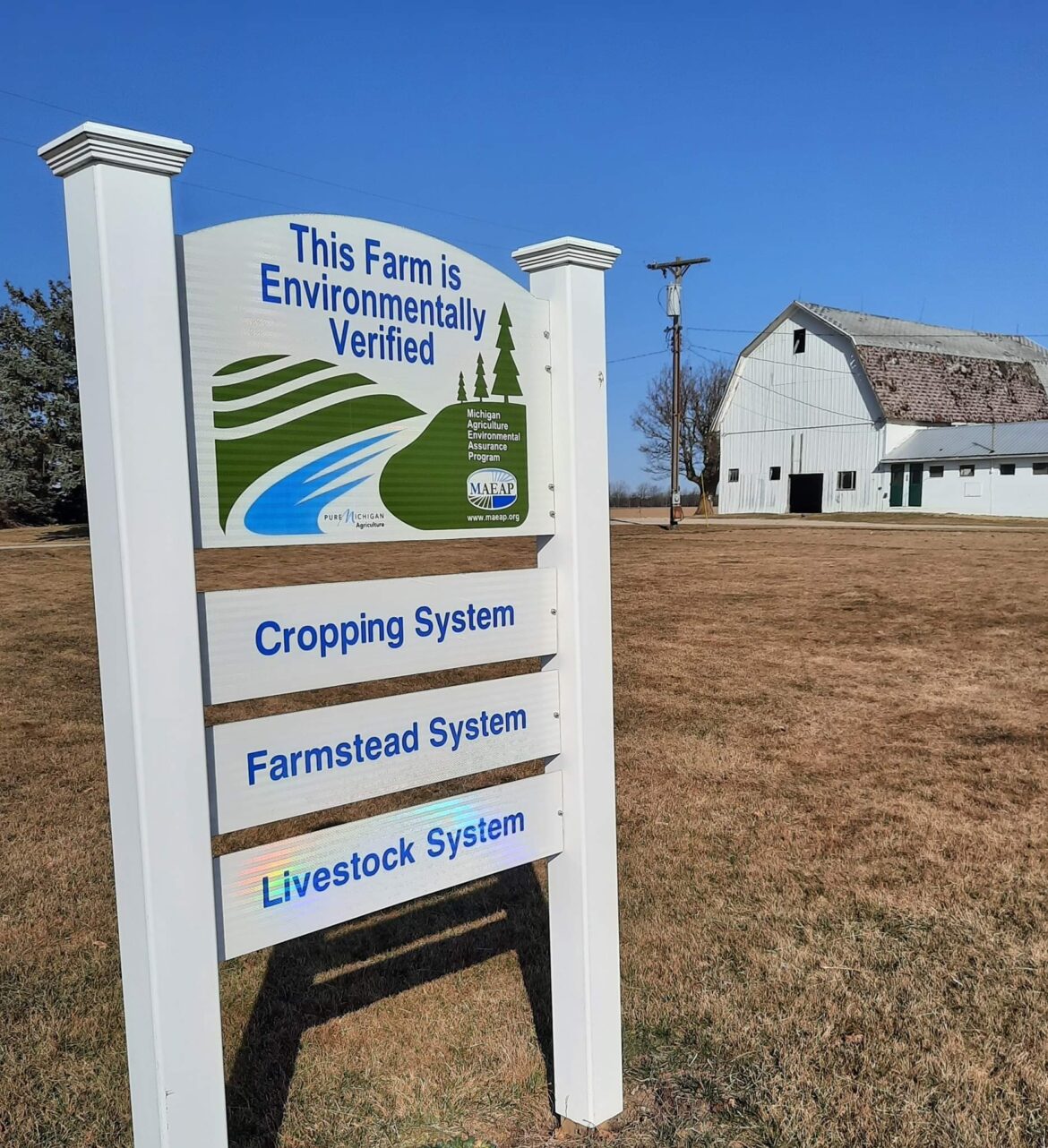
A sign on Allen Family Farms in Owosso, Michigan, shows the farm has met environmentally friendly standards under a state program. Image: Shelly Allen
By Sophia Lada
Capital News Service
When Shelly Allen and her husband purchased their farm in 2005, there were a lot of environmental red flags.
It was an old dairy farm. A nearby creek flowed into the woods. Cow manure ran off into the creek, which ran into a river, which eventually ran to the Great Lakes.
She said they had to completely change the farm set up into what is now Allen Family Farms of Owosso, Michigan.
“There were a lot of things here that they did, the previous owners, that was either really unsafe or we saw we could change to make better,” she said.
When the Allens bought their farm, they knew they would have children one day and wanted a farm that could be “prosperous and sustainable for them,” she said.
Agriculture accounts for 10.5% of greenhouse gas emissions in the United States and is affected by climate change.
Joe Kelpinski, the program manager of the Michigan Agriculture Environmental Assurance Program, said that within the last 20 years, there have been increasingly intense spring rains, specifically in the western Lake Erie basin.
Farmers can’t get into their fields when record rainfall occurs, and the rains can erode the soil.
Marci Baranski worked for the state Department of Agriculture and Rural Development until 2010 and later as a climate change specialist for the U.S. Department of Agriculture from 2015 to 2019. Now, she’s a research and development associate at Tradewater, a Chicago-based organization that works to reduce the world’s carbon footprint.
As the air gets warmer because of climate change, it can hold more water, leading to heavier rains at unusual times, she said.

A concrete manure containment barn on the Allen Family Farms keeps contaminants from reaching a creek on the property. Image: Shelly Allen
Baranski said there can often be a “false spring” in Michigan that can destroy crops because fruit trees can produce buds and then freeze over when the temperature drops.
Baranski said a common agricultural practice that causes greenhouse gas emissions is when farmers apply fertilizer in the winter.
The fertilizer can often wash off and cause water pollution. It can also vaporize and turn into nitrous oxide, a powerful greenhouse gas.
One solution to the problem is to inject fertilizer into the soil only where and when plants need it, she said.
Michigan Agri-business Association president Chuck Lippstreu said, “To remain viable for the long term, farmers have to be stewards of the air and land and water.”
One way to do that, he said, is through precision agriculture, or using in-field imagery, GPS and other technology to ensure that crop inputs (seeds and fertilizers) are targeted and purposeful.
Allen Family Farms uses a GPS fertilizer and sprayer system.
The Allens got involved with the Michigan Agriculture Environmental Assurance Program, a program of the Department of Agriculture and Rural Development that recognizes farmers who take care of their land. The program has verified 5,482 farms since it started in 1998.
Allen said they started attending educational events, and a county conservation technician came out and showed them what they needed to change.
That was phase one and two of MAEAP verification, program manager Joe Kelpinski said.
Allen said she and her husband installed filter strips, which are strips of grass between the manure and the creek, to keep manure from getting into the creek.
They also built a manure facility barn made of entirely concrete. There’s one for the cows in the winter and one for the manure.
Having a concrete manure facility prevents manure from spilling and helped Allen Family Farms become livestock-verified through the state program.
Livestock verification focuses on animal production practices.
Allen said they also rotate crops every year to keep the right nutrients and microbes in the soil. To check soil health, they submit samples to a lab and receive information about exactly what their soil needs.
Some of the biggest challenges to becoming an environmentally verified farm are change and money, Allen said.
It can be hard when farmers follow a method of operation for generations and then have to change, and it can sometimes be expensive.
Allen said they try to be resourceful with products they have by taking their uglier pumpkins in the fall and making dog treats or by donating leftover flowers to a nursing home.
Once farmers find out they can get assistance, she said, they have a more positive attitude about it.
Kelpinski, the program manager, said becoming environmentally verified is different for everyone.
“It’s not-a-one-size fits all,” he said.